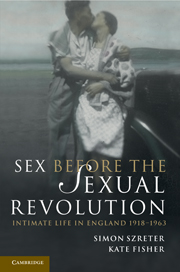Book contents
- Frontmatter
- Contents
- Acknowledgements
- 1 Introduction
- Part I What was sex?
- 2 The facts of life: learning about sex in childhood and youth
- 3 Sexual intimacies before marriage
- Part II What was love?
- Part III Exploring sex and love in marriage
- 10 Conclusion: private lives
- Appendix A The oral history sample: summary of project design and socio-demographic characteristics of the interviewees in Blackburn and north-west Hertfordshire
- Appendix B Note on social classification of the respondents
- Appendix C
- Bibliography
- Index
- Index of interviewees
2 - The facts of life: learning about sex in childhood and youth
Published online by Cambridge University Press: 05 June 2012
- Frontmatter
- Contents
- Acknowledgements
- 1 Introduction
- Part I What was sex?
- 2 The facts of life: learning about sex in childhood and youth
- 3 Sexual intimacies before marriage
- Part II What was love?
- Part III Exploring sex and love in marriage
- 10 Conclusion: private lives
- Appendix A The oral history sample: summary of project design and socio-demographic characteristics of the interviewees in Blackburn and north-west Hertfordshire
- Appendix B Note on social classification of the respondents
- Appendix C
- Bibliography
- Index
- Index of interviewees
Summary
This chapter explores the ways in which young people growing up between the late 1910s and the early 1940s learned about reproduction and sex in the context of a public culture which avoided explicit reference to the subject and where the only official information available related to potential health dangers. In order to preserve the innocence of its young women, British society and popular culture during the first half of the twentieth century was constructed so as to exclude as far as possible all explicit references to sexual intercourse from both public and even private discourse within the family, particularly during the first decades of the twentieth century. Nevertheless, society did not insist on male innocence, though it was as important for a young man's honour as for a young woman's not to be held publicly responsible for a pregnancy in the community, unless he was prepared to go through with marriage. Indeed, it was accepted that somehow young men should and would acquire the necessary knowledge prior to marriage. Crucially, therefore, men and women offer very different narratives of how they responded to the culture of ignorance surrounding sex. Where a young woman, determined to be virtuous, knew it was safest to hold to a strategy of preserving her innocence, a respectable young man needed to acquire a degree of knowledge without being morally tainted by it.
- Type
- Chapter
- Information
- Sex Before the Sexual RevolutionIntimate Life in England 1918–1963, pp. 63 - 112Publisher: Cambridge University PressPrint publication year: 2010



